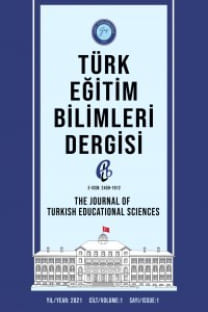GENİŞLETİLMİŞ MİKRO ÖĞRETİM YAŞANTILARI HAKKINDA MATEMATİK ÖĞRETMENİ ADAYLARININ GÖRÜŞLERİ
Mikro öğretim, genişletilmiş mikro öğretim, öğretmen yetiştirme, matematik
PRE-SERVICE MATHEMATICS TEACHER PERSPECTIVES ABOUT THE EXPANDED MICROTEACHING EXPERIENCES
___
- Akalın, S. (2005). Öğretmen adaylarının okullardaki öğretmenlik uygulamaları sırasında geleneksel öğretmenlik uygulamasıyla mikro öğretim uygulamasının karşılaştırılması. Eğitim Araştırmaları Dergisi, 20, 1-13.
- Amobi, F. A. (2005). Preservice teachers’ reflectivity on the sequence and consequences of teaching actions in a microteaching experience. Teacher Education Quarterly, 32(1), 115-130.
- Baki, A. (1996). Nitelikli matematik öğretmeninin alan eğitimi bilgisi. Modern Öğretmen Yetiştirmede Gelişme ve İlerlemeler Sempozyumu, 624-630, Ankara.
- Baki, A. (1997). Çağdaş gelişmeler ışığında matematik öğretmenliği eğitimi programları. Eğitim ve Bilim, 21(103), 46-54.
- Benton-Kupper, J.B. (2001). The microteaching experience: Student perspectives. Education, 121(4), 830-835.
- Butler, A. (2001). Preservice music teachers’ conceptions of teaching effectiveness, microteaching experiences, and teaching performance. Journal of Research in Music Education, 49(3), 258-272.
- Copeland, W.D. (1975). The relationship between microteaching and student teacher classroom performance. The Journal of Educational Research, 68(8), 289- 293.
- Durmus, S. (2004). Matematikte öğrenme güçlüklerinin saptanması üzerine bir çalışma. Kastamonu Eğitim Dergisi, 12(1), 125-128.
- Goulding, M., Hatch, G., Rodd, M. (2003). Undergraduate mathematics experience: its significance in secondary mathematics teacher preparation. Journal of Mathematics Teacher Education, 6, 361-393.
- Hiebert, J., Morris, A.K., Glass, B. (2003). Learning to learn to teach: an “experiment” model for teaching and teacher preparation in mathematics. Journal of Mathematics Teacher Education, 6, 201-222.
- Higgins, A., Nicholl, H. (2003). The experiences of lecturers and students in the use of microteaching as a teaching strategy. Nurse Education in Practice,3, 220- 227.
- Huber, J., Ward, B.E. (1969). Pre-service confidence through microteaching. Education, 90(1), 65-68.
- Kaya, Z. (2005). Öğretim teknolojileri ve materyal geliştirme. Ankara: PegemA Yayıncılık.
- Klinzing, H.G., Floden, R.E. (1991). The development of the microteaching movement in Europa. Paper presented at the Annual Meeting of the American Educational Research Assocation in Chicago, IL.
- Kpanja, E. (2001). A study of the effects of video tape recording in microteaching training. British Journal of Educational Technology, 32(4), 483-486.
- MEB. (2004). İlköğretim matematik dersi (1-5. sınıflar) öğretim programı. Ankara: Devlet Kitapları Müdürlüğü Basımevi.
- MEB. (2005). İlköğretim matematik dersi (6-8. sınıflar) öğretim programı. Ankara: Devlet Kitapları Müdürlüğü Basımevi.
- MEGEP. (1998). Öğretmen eğitimi dizisi: Fakülte-okul işbirliği. Ankara: YÖK yayını.
- Olkun, S., Aydogdu, T. (2003). Üçüncü uluslararası matematik ve fen araştırması (timms): matematik nedir? Neyi sorgular? Örnek geometri soruları ve etkinlikleri. İlköğretim-Online, 2(1), 28-35. İnternetten 2 Mart 2007’de elde edilmiştir: http://www.ilkogretim-online.org.tr.
- Subramaniam, K. (2006). Creating a microteaching evaluation form: The needed evaluation criteria. Education, 126(4), 666-667.
- Toluk, Z. (2003). Üçüncü uluslararası matematik ve fen araştırması (TIMMS): matematik nedir? İlköğretim-Online, 2(1), 36-41. İnternetten 2 Mart 2007’de elde edilmiştir: http://www.ilkogretim-online.org.tr.
- Ubuz, B. (2002). Üniversite eğitimi ve öğretmenlik: Matematik öğretmenlerinin ve adayların görüşleri. V. Ulusal Fen Bilimleri ve Matematik Eğitimi Kongresi, Ankara.
- Umay, A. (2002). İlköğretim matematik öğretmenliği programının öğrencilerin matematiğe karşı özyeterlik algısına etkisi. V. Ulusal Fen Bilimleri ve Matematik Eğitimi Kongresi, Ankara.
- Başlangıç: 2003
- Yayıncı: ANKARA HACI BAYRAM VELİ ÜNİVERSİTESİ
Çoklu zeka kuramına dayalı etkinliklerin kavramsal öğrenmeye etkisi: Tam sayılarda dört işlem örneği
Ercan ATASOY, Adnan BAKİ, Suat ÜNAL, Ramazan GÜRBÜZ
İlköğretim birinci kademesinde çoklu zeka kuramı uygulamalarının erişiye etkisi
A. Seda SARACALOĞLU, Murat ÇIRAKOĞLU
Hasan BACANLI, Tahsin İLHAN, Sevda ASLAN
GENİŞLETİLMİŞ MİKRO ÖĞRETİM YAŞANTILARI HAKKINDA MATEMATİK ÖĞRETMENİ ADAYLARININ GÖRÜŞLERİ
Probleme dayalı öğrenmenin öğrencilerin eleştirel düşünme becerilerine etkisi
Cantürk Berna GÜNHAN, Neşe BAŞER
Türkan SARIKAYA, Leyla KHORSHID
Hasan BACANLI, Tahsin İLHAN, Sevda ASLAN
Selim Sabit Efendi'nin okul tarihi inşası
SELİM SABİT EFENDİ’NİN OKUL TARİHİ İNŞASI
SOSYAL BİLGİLER ÖĞRETİMİNDE TARİHİ YERLERİN KULLANIMININ AKADEMİK BAŞARIYA ETKİSİ
